Report on the UK Legal System for Business Law - BMP4002 Assessment
VerifiedAdded on 2023/06/10
|9
|2772
|66
Report
AI Summary
This report provides a detailed analysis of the UK legal system, covering its classifications, sources, and application to employment law. It begins by defining laws and identifying the legal systems in the UK, including civil and criminal law distinctions and the roles of the High Court and Supreme Court. The report then explores case law and legislation as sources of law, explaining the process of making legislation and delegated legislation. Finally, it examines UK employment law, focusing on statutory duties of employers, wrongful dismissal, and unfair dismissal actions. The document concludes by emphasizing the importance of understanding the UK legal framework for businesses and employees alike, highlighting the role of resources like Desklib in providing access to solved assignments and study materials.
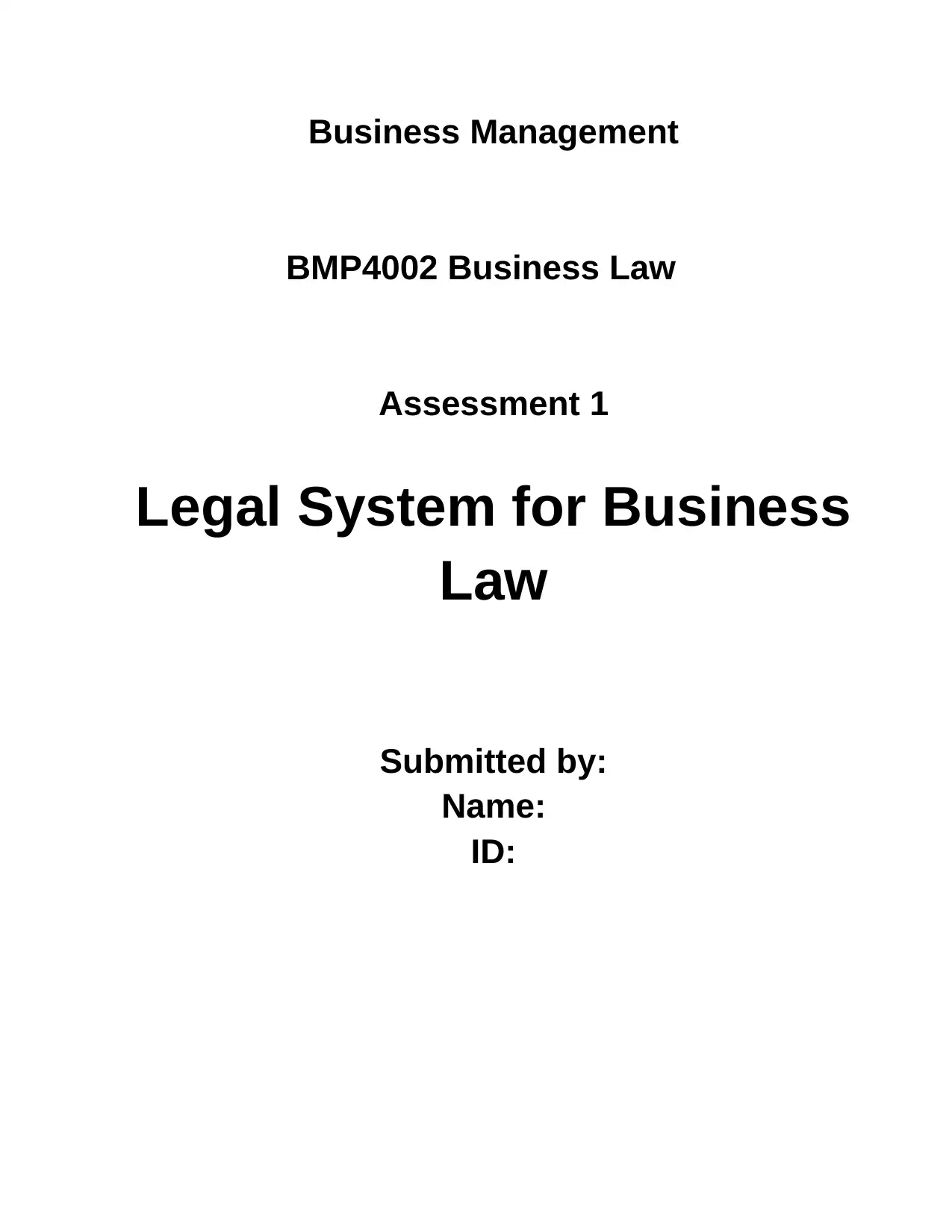
Business Management
BMP4002 Business Law
Assessment 1
Legal System for Business
Law
Submitted by:
Name:
ID:
BMP4002 Business Law
Assessment 1
Legal System for Business
Law
Submitted by:
Name:
ID:
Paraphrase This Document
Need a fresh take? Get an instant paraphrase of this document with our AI Paraphraser
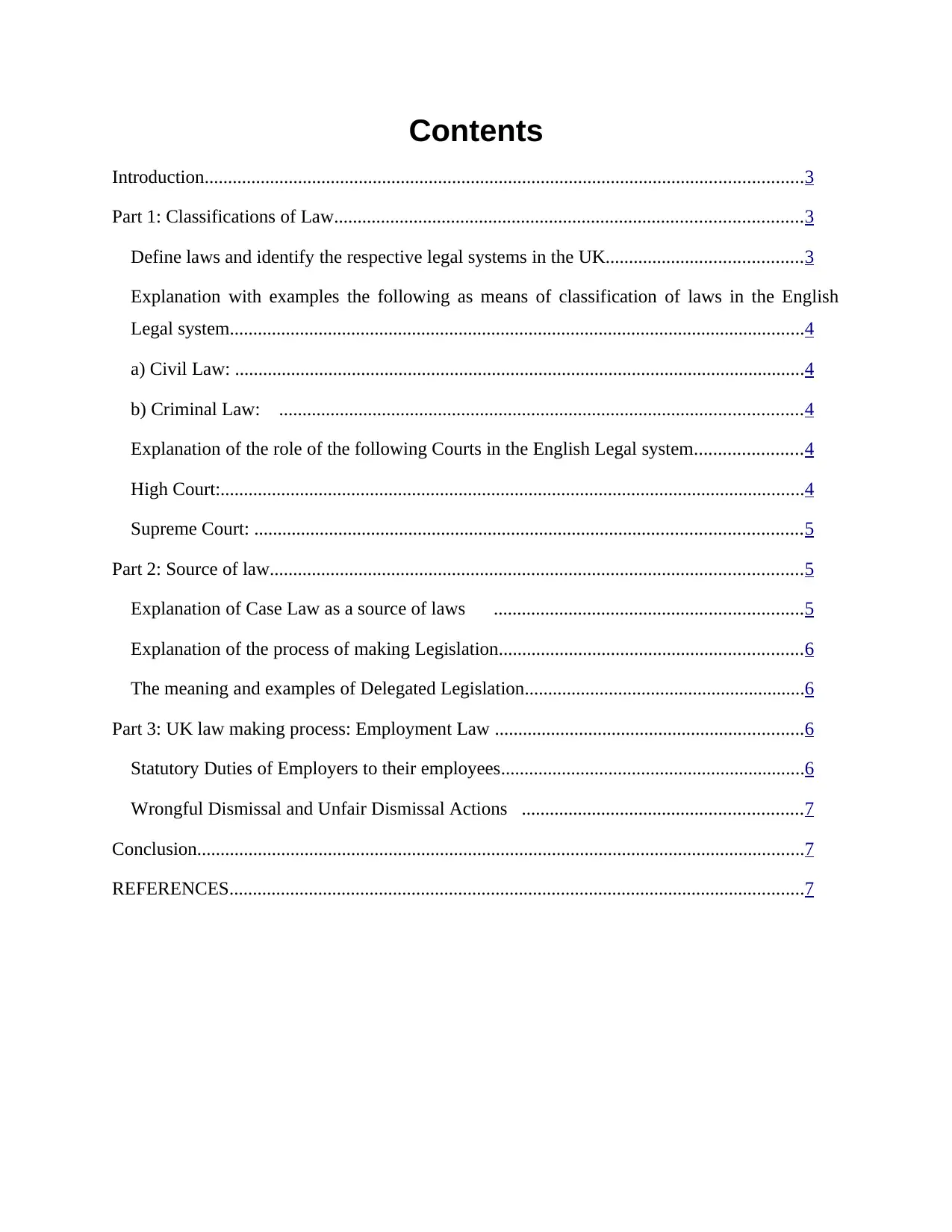
Contents
Introduction................................................................................................................................3
Part 1: Classifications of Law....................................................................................................3
Define laws and identify the respective legal systems in the UK..........................................3
Explanation with examples the following as means of classification of laws in the English
Legal system...........................................................................................................................4
a) Civil Law: ..........................................................................................................................4
b) Criminal Law: ................................................................................................................4
Explanation of the role of the following Courts in the English Legal system.......................4
High Court:.............................................................................................................................4
Supreme Court: .....................................................................................................................5
Part 2: Source of law..................................................................................................................5
Explanation of Case Law as a source of laws ..................................................................5
Explanation of the process of making Legislation.................................................................6
The meaning and examples of Delegated Legislation............................................................6
Part 3: UK law making process: Employment Law ..................................................................6
Statutory Duties of Employers to their employees.................................................................6
Wrongful Dismissal and Unfair Dismissal Actions ............................................................7
Conclusion..................................................................................................................................7
REFERENCES...........................................................................................................................7
Introduction................................................................................................................................3
Part 1: Classifications of Law....................................................................................................3
Define laws and identify the respective legal systems in the UK..........................................3
Explanation with examples the following as means of classification of laws in the English
Legal system...........................................................................................................................4
a) Civil Law: ..........................................................................................................................4
b) Criminal Law: ................................................................................................................4
Explanation of the role of the following Courts in the English Legal system.......................4
High Court:.............................................................................................................................4
Supreme Court: .....................................................................................................................5
Part 2: Source of law..................................................................................................................5
Explanation of Case Law as a source of laws ..................................................................5
Explanation of the process of making Legislation.................................................................6
The meaning and examples of Delegated Legislation............................................................6
Part 3: UK law making process: Employment Law ..................................................................6
Statutory Duties of Employers to their employees.................................................................6
Wrongful Dismissal and Unfair Dismissal Actions ............................................................7
Conclusion..................................................................................................................................7
REFERENCES...........................................................................................................................7
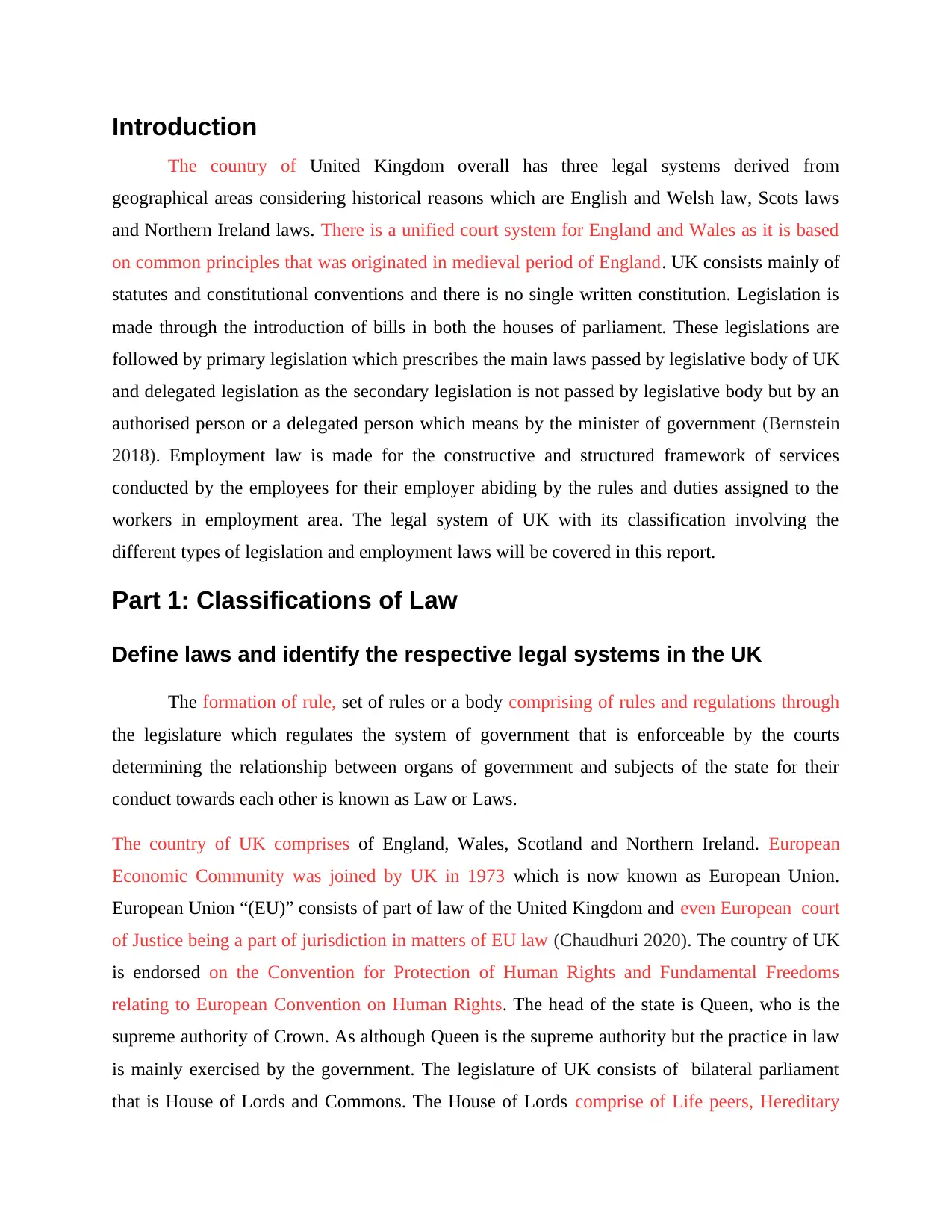
Introduction
The country of United Kingdom overall has three legal systems derived from
geographical areas considering historical reasons which are English and Welsh law, Scots laws
and Northern Ireland laws. There is a unified court system for England and Wales as it is based
on common principles that was originated in medieval period of England. UK consists mainly of
statutes and constitutional conventions and there is no single written constitution. Legislation is
made through the introduction of bills in both the houses of parliament. These legislations are
followed by primary legislation which prescribes the main laws passed by legislative body of UK
and delegated legislation as the secondary legislation is not passed by legislative body but by an
authorised person or a delegated person which means by the minister of government (Bernstein
2018). Employment law is made for the constructive and structured framework of services
conducted by the employees for their employer abiding by the rules and duties assigned to the
workers in employment area. The legal system of UK with its classification involving the
different types of legislation and employment laws will be covered in this report.
Part 1: Classifications of Law
Define laws and identify the respective legal systems in the UK
The formation of rule, set of rules or a body comprising of rules and regulations through
the legislature which regulates the system of government that is enforceable by the courts
determining the relationship between organs of government and subjects of the state for their
conduct towards each other is known as Law or Laws.
The country of UK comprises of England, Wales, Scotland and Northern Ireland. European
Economic Community was joined by UK in 1973 which is now known as European Union.
European Union “(EU)” consists of part of law of the United Kingdom and even European court
of Justice being a part of jurisdiction in matters of EU law (Chaudhuri 2020). The country of UK
is endorsed on the Convention for Protection of Human Rights and Fundamental Freedoms
relating to European Convention on Human Rights. The head of the state is Queen, who is the
supreme authority of Crown. As although Queen is the supreme authority but the practice in law
is mainly exercised by the government. The legislature of UK consists of bilateral parliament
that is House of Lords and Commons. The House of Lords comprise of Life peers, Hereditary
The country of United Kingdom overall has three legal systems derived from
geographical areas considering historical reasons which are English and Welsh law, Scots laws
and Northern Ireland laws. There is a unified court system for England and Wales as it is based
on common principles that was originated in medieval period of England. UK consists mainly of
statutes and constitutional conventions and there is no single written constitution. Legislation is
made through the introduction of bills in both the houses of parliament. These legislations are
followed by primary legislation which prescribes the main laws passed by legislative body of UK
and delegated legislation as the secondary legislation is not passed by legislative body but by an
authorised person or a delegated person which means by the minister of government (Bernstein
2018). Employment law is made for the constructive and structured framework of services
conducted by the employees for their employer abiding by the rules and duties assigned to the
workers in employment area. The legal system of UK with its classification involving the
different types of legislation and employment laws will be covered in this report.
Part 1: Classifications of Law
Define laws and identify the respective legal systems in the UK
The formation of rule, set of rules or a body comprising of rules and regulations through
the legislature which regulates the system of government that is enforceable by the courts
determining the relationship between organs of government and subjects of the state for their
conduct towards each other is known as Law or Laws.
The country of UK comprises of England, Wales, Scotland and Northern Ireland. European
Economic Community was joined by UK in 1973 which is now known as European Union.
European Union “(EU)” consists of part of law of the United Kingdom and even European court
of Justice being a part of jurisdiction in matters of EU law (Chaudhuri 2020). The country of UK
is endorsed on the Convention for Protection of Human Rights and Fundamental Freedoms
relating to European Convention on Human Rights. The head of the state is Queen, who is the
supreme authority of Crown. As although Queen is the supreme authority but the practice in law
is mainly exercised by the government. The legislature of UK consists of bilateral parliament
that is House of Lords and Commons. The House of Lords comprise of Life peers, Hereditary
⊘ This is a preview!⊘
Do you want full access?
Subscribe today to unlock all pages.

Trusted by 1+ million students worldwide
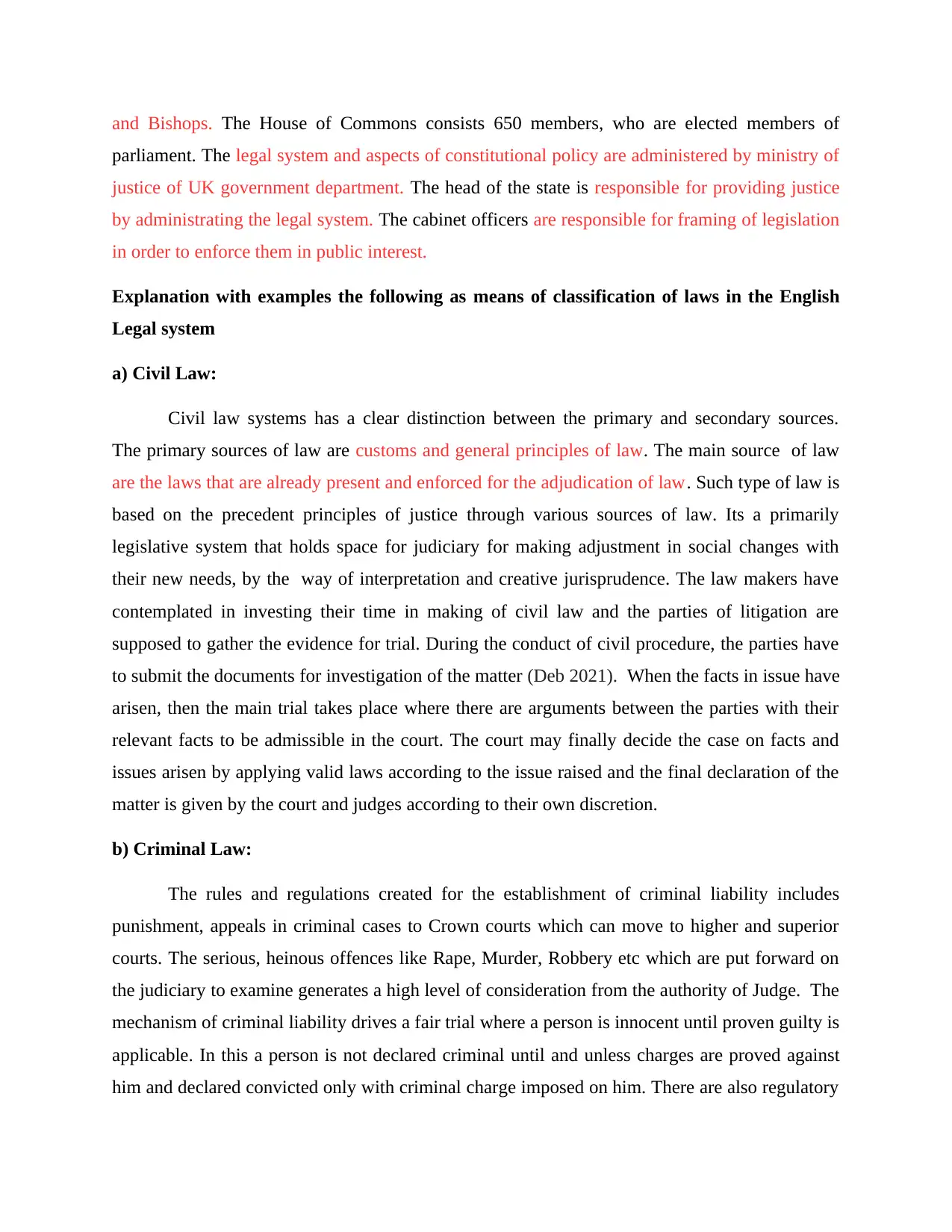
and Bishops. The House of Commons consists 650 members, who are elected members of
parliament. The legal system and aspects of constitutional policy are administered by ministry of
justice of UK government department. The head of the state is responsible for providing justice
by administrating the legal system. The cabinet officers are responsible for framing of legislation
in order to enforce them in public interest.
Explanation with examples the following as means of classification of laws in the English
Legal system
a) Civil Law:
Civil law systems has a clear distinction between the primary and secondary sources.
The primary sources of law are customs and general principles of law. The main source of law
are the laws that are already present and enforced for the adjudication of law. Such type of law is
based on the precedent principles of justice through various sources of law. Its a primarily
legislative system that holds space for judiciary for making adjustment in social changes with
their new needs, by the way of interpretation and creative jurisprudence. The law makers have
contemplated in investing their time in making of civil law and the parties of litigation are
supposed to gather the evidence for trial. During the conduct of civil procedure, the parties have
to submit the documents for investigation of the matter (Deb 2021). When the facts in issue have
arisen, then the main trial takes place where there are arguments between the parties with their
relevant facts to be admissible in the court. The court may finally decide the case on facts and
issues arisen by applying valid laws according to the issue raised and the final declaration of the
matter is given by the court and judges according to their own discretion.
b) Criminal Law:
The rules and regulations created for the establishment of criminal liability includes
punishment, appeals in criminal cases to Crown courts which can move to higher and superior
courts. The serious, heinous offences like Rape, Murder, Robbery etc which are put forward on
the judiciary to examine generates a high level of consideration from the authority of Judge. The
mechanism of criminal liability drives a fair trial where a person is innocent until proven guilty is
applicable. In this a person is not declared criminal until and unless charges are proved against
him and declared convicted only with criminal charge imposed on him. There are also regulatory
parliament. The legal system and aspects of constitutional policy are administered by ministry of
justice of UK government department. The head of the state is responsible for providing justice
by administrating the legal system. The cabinet officers are responsible for framing of legislation
in order to enforce them in public interest.
Explanation with examples the following as means of classification of laws in the English
Legal system
a) Civil Law:
Civil law systems has a clear distinction between the primary and secondary sources.
The primary sources of law are customs and general principles of law. The main source of law
are the laws that are already present and enforced for the adjudication of law. Such type of law is
based on the precedent principles of justice through various sources of law. Its a primarily
legislative system that holds space for judiciary for making adjustment in social changes with
their new needs, by the way of interpretation and creative jurisprudence. The law makers have
contemplated in investing their time in making of civil law and the parties of litigation are
supposed to gather the evidence for trial. During the conduct of civil procedure, the parties have
to submit the documents for investigation of the matter (Deb 2021). When the facts in issue have
arisen, then the main trial takes place where there are arguments between the parties with their
relevant facts to be admissible in the court. The court may finally decide the case on facts and
issues arisen by applying valid laws according to the issue raised and the final declaration of the
matter is given by the court and judges according to their own discretion.
b) Criminal Law:
The rules and regulations created for the establishment of criminal liability includes
punishment, appeals in criminal cases to Crown courts which can move to higher and superior
courts. The serious, heinous offences like Rape, Murder, Robbery etc which are put forward on
the judiciary to examine generates a high level of consideration from the authority of Judge. The
mechanism of criminal liability drives a fair trial where a person is innocent until proven guilty is
applicable. In this a person is not declared criminal until and unless charges are proved against
him and declared convicted only with criminal charge imposed on him. There are also regulatory
Paraphrase This Document
Need a fresh take? Get an instant paraphrase of this document with our AI Paraphraser
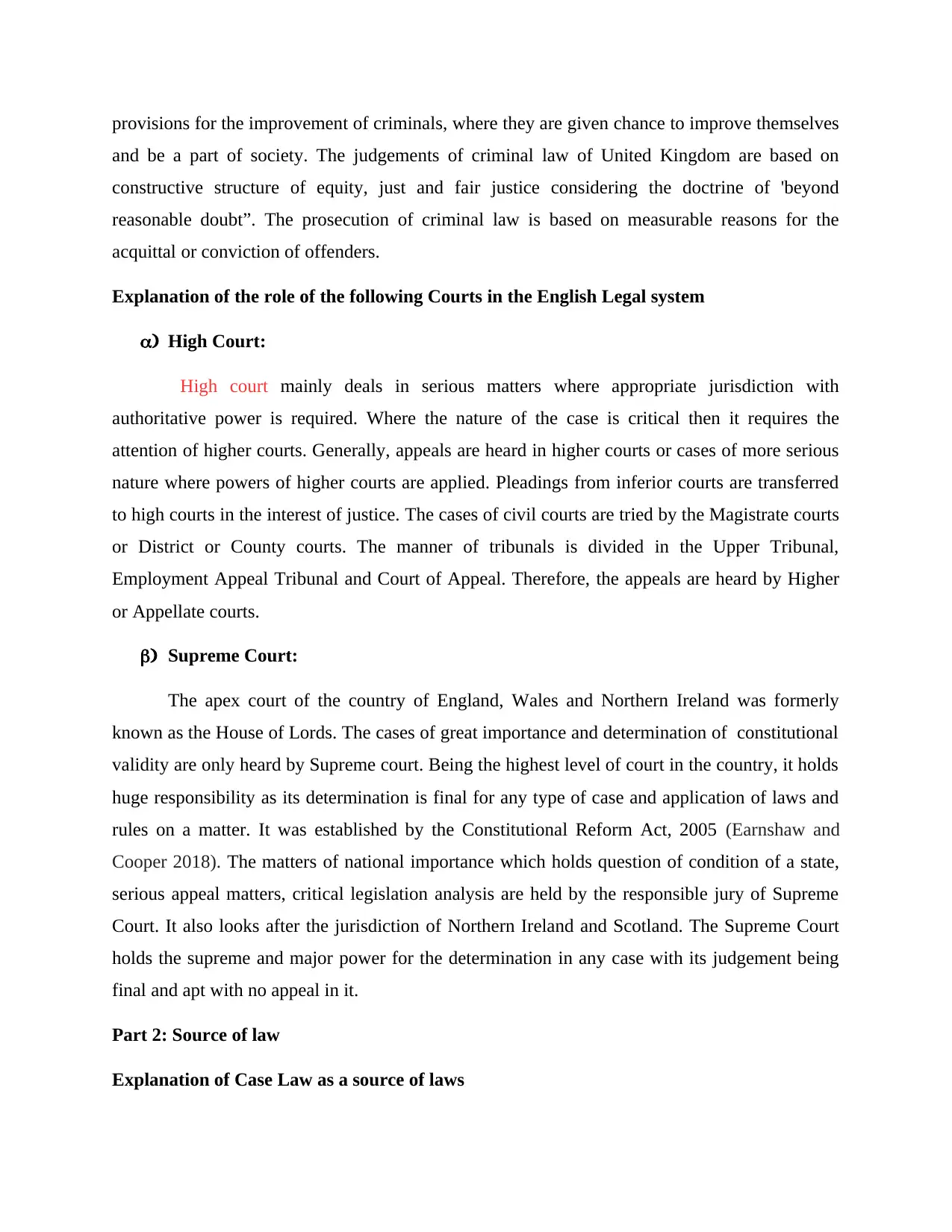
provisions for the improvement of criminals, where they are given chance to improve themselves
and be a part of society. The judgements of criminal law of United Kingdom are based on
constructive structure of equity, just and fair justice considering the doctrine of 'beyond
reasonable doubt”. The prosecution of criminal law is based on measurable reasons for the
acquittal or conviction of offenders.
Explanation of the role of the following Courts in the English Legal system
a) High Court:
High court mainly deals in serious matters where appropriate jurisdiction with
authoritative power is required. Where the nature of the case is critical then it requires the
attention of higher courts. Generally, appeals are heard in higher courts or cases of more serious
nature where powers of higher courts are applied. Pleadings from inferior courts are transferred
to high courts in the interest of justice. The cases of civil courts are tried by the Magistrate courts
or District or County courts. The manner of tribunals is divided in the Upper Tribunal,
Employment Appeal Tribunal and Court of Appeal. Therefore, the appeals are heard by Higher
or Appellate courts.
b) Supreme Court:
The apex court of the country of England, Wales and Northern Ireland was formerly
known as the House of Lords. The cases of great importance and determination of constitutional
validity are only heard by Supreme court. Being the highest level of court in the country, it holds
huge responsibility as its determination is final for any type of case and application of laws and
rules on a matter. It was established by the Constitutional Reform Act, 2005 (Earnshaw and
Cooper 2018). The matters of national importance which holds question of condition of a state,
serious appeal matters, critical legislation analysis are held by the responsible jury of Supreme
Court. It also looks after the jurisdiction of Northern Ireland and Scotland. The Supreme Court
holds the supreme and major power for the determination in any case with its judgement being
final and apt with no appeal in it.
Part 2: Source of law
Explanation of Case Law as a source of laws
and be a part of society. The judgements of criminal law of United Kingdom are based on
constructive structure of equity, just and fair justice considering the doctrine of 'beyond
reasonable doubt”. The prosecution of criminal law is based on measurable reasons for the
acquittal or conviction of offenders.
Explanation of the role of the following Courts in the English Legal system
a) High Court:
High court mainly deals in serious matters where appropriate jurisdiction with
authoritative power is required. Where the nature of the case is critical then it requires the
attention of higher courts. Generally, appeals are heard in higher courts or cases of more serious
nature where powers of higher courts are applied. Pleadings from inferior courts are transferred
to high courts in the interest of justice. The cases of civil courts are tried by the Magistrate courts
or District or County courts. The manner of tribunals is divided in the Upper Tribunal,
Employment Appeal Tribunal and Court of Appeal. Therefore, the appeals are heard by Higher
or Appellate courts.
b) Supreme Court:
The apex court of the country of England, Wales and Northern Ireland was formerly
known as the House of Lords. The cases of great importance and determination of constitutional
validity are only heard by Supreme court. Being the highest level of court in the country, it holds
huge responsibility as its determination is final for any type of case and application of laws and
rules on a matter. It was established by the Constitutional Reform Act, 2005 (Earnshaw and
Cooper 2018). The matters of national importance which holds question of condition of a state,
serious appeal matters, critical legislation analysis are held by the responsible jury of Supreme
Court. It also looks after the jurisdiction of Northern Ireland and Scotland. The Supreme Court
holds the supreme and major power for the determination in any case with its judgement being
final and apt with no appeal in it.
Part 2: Source of law
Explanation of Case Law as a source of laws
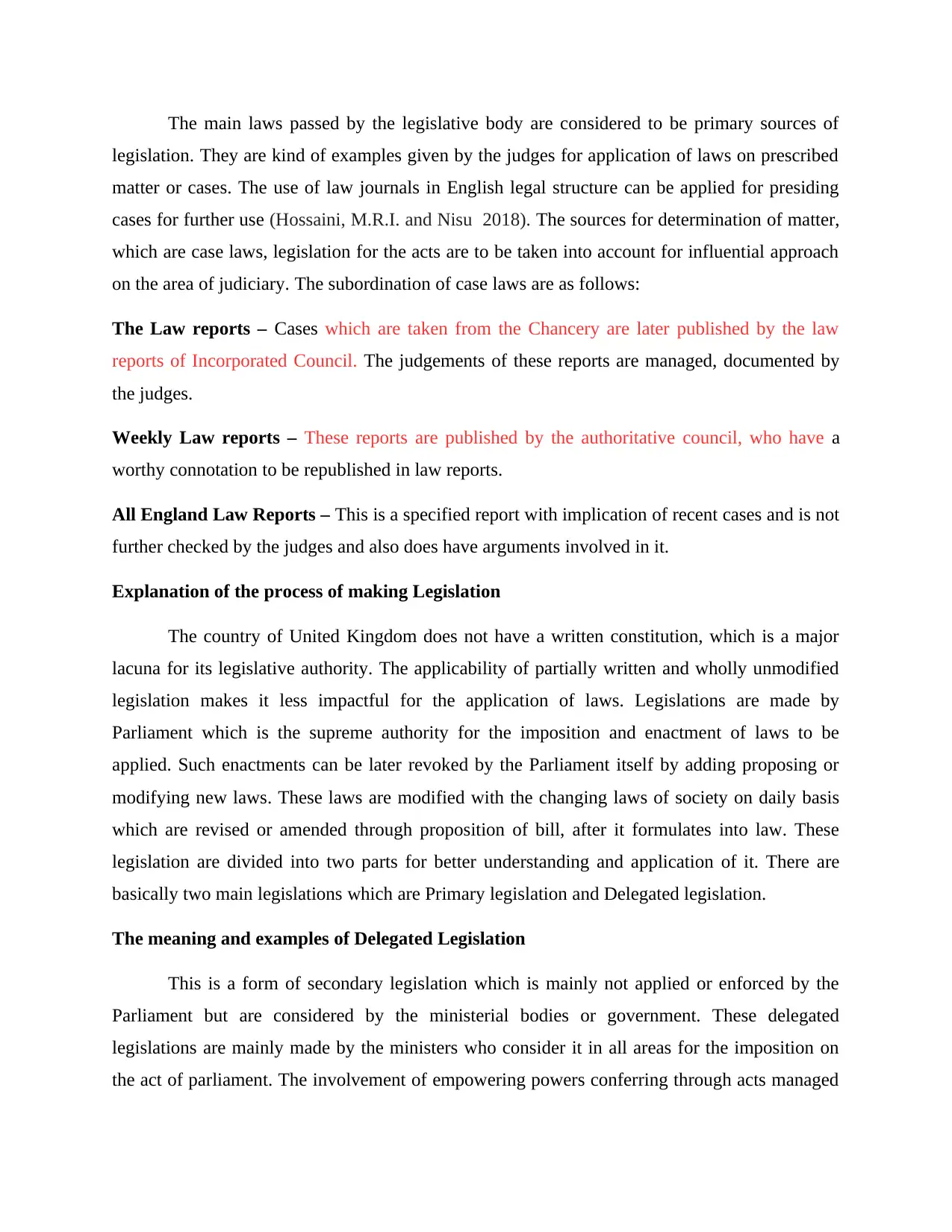
The main laws passed by the legislative body are considered to be primary sources of
legislation. They are kind of examples given by the judges for application of laws on prescribed
matter or cases. The use of law journals in English legal structure can be applied for presiding
cases for further use (Hossaini, M.R.I. and Nisu 2018). The sources for determination of matter,
which are case laws, legislation for the acts are to be taken into account for influential approach
on the area of judiciary. The subordination of case laws are as follows:
The Law reports – Cases which are taken from the Chancery are later published by the law
reports of Incorporated Council. The judgements of these reports are managed, documented by
the judges.
Weekly Law reports – These reports are published by the authoritative council, who have a
worthy connotation to be republished in law reports.
All England Law Reports – This is a specified report with implication of recent cases and is not
further checked by the judges and also does have arguments involved in it.
Explanation of the process of making Legislation
The country of United Kingdom does not have a written constitution, which is a major
lacuna for its legislative authority. The applicability of partially written and wholly unmodified
legislation makes it less impactful for the application of laws. Legislations are made by
Parliament which is the supreme authority for the imposition and enactment of laws to be
applied. Such enactments can be later revoked by the Parliament itself by adding proposing or
modifying new laws. These laws are modified with the changing laws of society on daily basis
which are revised or amended through proposition of bill, after it formulates into law. These
legislation are divided into two parts for better understanding and application of it. There are
basically two main legislations which are Primary legislation and Delegated legislation.
The meaning and examples of Delegated Legislation
This is a form of secondary legislation which is mainly not applied or enforced by the
Parliament but are considered by the ministerial bodies or government. These delegated
legislations are mainly made by the ministers who consider it in all areas for the imposition on
the act of parliament. The involvement of empowering powers conferring through acts managed
legislation. They are kind of examples given by the judges for application of laws on prescribed
matter or cases. The use of law journals in English legal structure can be applied for presiding
cases for further use (Hossaini, M.R.I. and Nisu 2018). The sources for determination of matter,
which are case laws, legislation for the acts are to be taken into account for influential approach
on the area of judiciary. The subordination of case laws are as follows:
The Law reports – Cases which are taken from the Chancery are later published by the law
reports of Incorporated Council. The judgements of these reports are managed, documented by
the judges.
Weekly Law reports – These reports are published by the authoritative council, who have a
worthy connotation to be republished in law reports.
All England Law Reports – This is a specified report with implication of recent cases and is not
further checked by the judges and also does have arguments involved in it.
Explanation of the process of making Legislation
The country of United Kingdom does not have a written constitution, which is a major
lacuna for its legislative authority. The applicability of partially written and wholly unmodified
legislation makes it less impactful for the application of laws. Legislations are made by
Parliament which is the supreme authority for the imposition and enactment of laws to be
applied. Such enactments can be later revoked by the Parliament itself by adding proposing or
modifying new laws. These laws are modified with the changing laws of society on daily basis
which are revised or amended through proposition of bill, after it formulates into law. These
legislation are divided into two parts for better understanding and application of it. There are
basically two main legislations which are Primary legislation and Delegated legislation.
The meaning and examples of Delegated Legislation
This is a form of secondary legislation which is mainly not applied or enforced by the
Parliament but are considered by the ministerial bodies or government. These delegated
legislations are mainly made by the ministers who consider it in all areas for the imposition on
the act of parliament. The involvement of empowering powers conferring through acts managed
⊘ This is a preview!⊘
Do you want full access?
Subscribe today to unlock all pages.

Trusted by 1+ million students worldwide
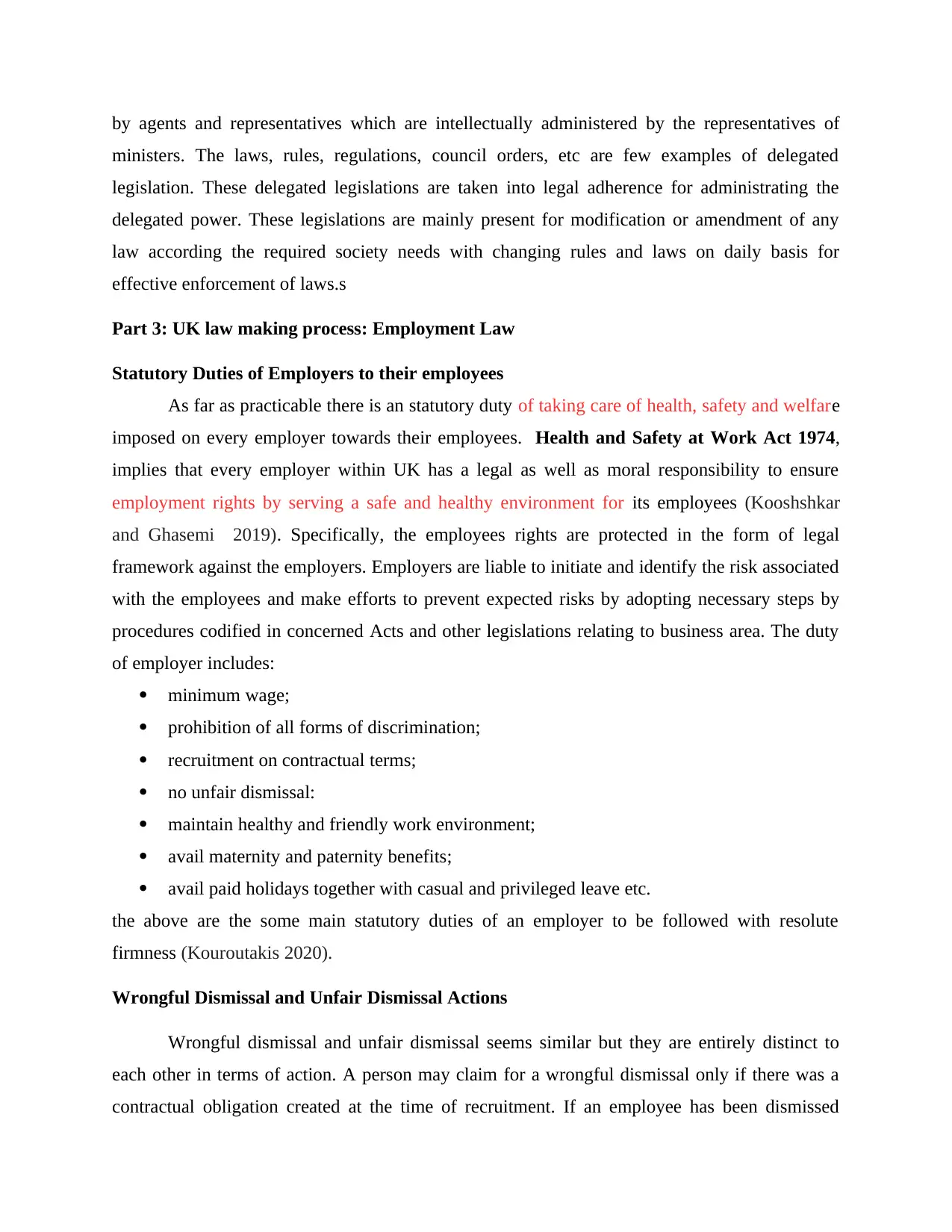
by agents and representatives which are intellectually administered by the representatives of
ministers. The laws, rules, regulations, council orders, etc are few examples of delegated
legislation. These delegated legislations are taken into legal adherence for administrating the
delegated power. These legislations are mainly present for modification or amendment of any
law according the required society needs with changing rules and laws on daily basis for
effective enforcement of laws.s
Part 3: UK law making process: Employment Law
Statutory Duties of Employers to their employees
As far as practicable there is an statutory duty of taking care of health, safety and welfare
imposed on every employer towards their employees. Health and Safety at Work Act 1974,
implies that every employer within UK has a legal as well as moral responsibility to ensure
employment rights by serving a safe and healthy environment for its employees (Kooshshkar
and Ghasemi 2019). Specifically, the employees rights are protected in the form of legal
framework against the employers. Employers are liable to initiate and identify the risk associated
with the employees and make efforts to prevent expected risks by adopting necessary steps by
procedures codified in concerned Acts and other legislations relating to business area. The duty
of employer includes:
minimum wage;
prohibition of all forms of discrimination;
recruitment on contractual terms;
no unfair dismissal:
maintain healthy and friendly work environment;
avail maternity and paternity benefits;
avail paid holidays together with casual and privileged leave etc.
the above are the some main statutory duties of an employer to be followed with resolute
firmness (Kouroutakis 2020).
Wrongful Dismissal and Unfair Dismissal Actions
Wrongful dismissal and unfair dismissal seems similar but they are entirely distinct to
each other in terms of action. A person may claim for a wrongful dismissal only if there was a
contractual obligation created at the time of recruitment. If an employee has been dismissed
ministers. The laws, rules, regulations, council orders, etc are few examples of delegated
legislation. These delegated legislations are taken into legal adherence for administrating the
delegated power. These legislations are mainly present for modification or amendment of any
law according the required society needs with changing rules and laws on daily basis for
effective enforcement of laws.s
Part 3: UK law making process: Employment Law
Statutory Duties of Employers to their employees
As far as practicable there is an statutory duty of taking care of health, safety and welfare
imposed on every employer towards their employees. Health and Safety at Work Act 1974,
implies that every employer within UK has a legal as well as moral responsibility to ensure
employment rights by serving a safe and healthy environment for its employees (Kooshshkar
and Ghasemi 2019). Specifically, the employees rights are protected in the form of legal
framework against the employers. Employers are liable to initiate and identify the risk associated
with the employees and make efforts to prevent expected risks by adopting necessary steps by
procedures codified in concerned Acts and other legislations relating to business area. The duty
of employer includes:
minimum wage;
prohibition of all forms of discrimination;
recruitment on contractual terms;
no unfair dismissal:
maintain healthy and friendly work environment;
avail maternity and paternity benefits;
avail paid holidays together with casual and privileged leave etc.
the above are the some main statutory duties of an employer to be followed with resolute
firmness (Kouroutakis 2020).
Wrongful Dismissal and Unfair Dismissal Actions
Wrongful dismissal and unfair dismissal seems similar but they are entirely distinct to
each other in terms of action. A person may claim for a wrongful dismissal only if there was a
contractual obligation created at the time of recruitment. If an employee has been dismissed
Paraphrase This Document
Need a fresh take? Get an instant paraphrase of this document with our AI Paraphraser
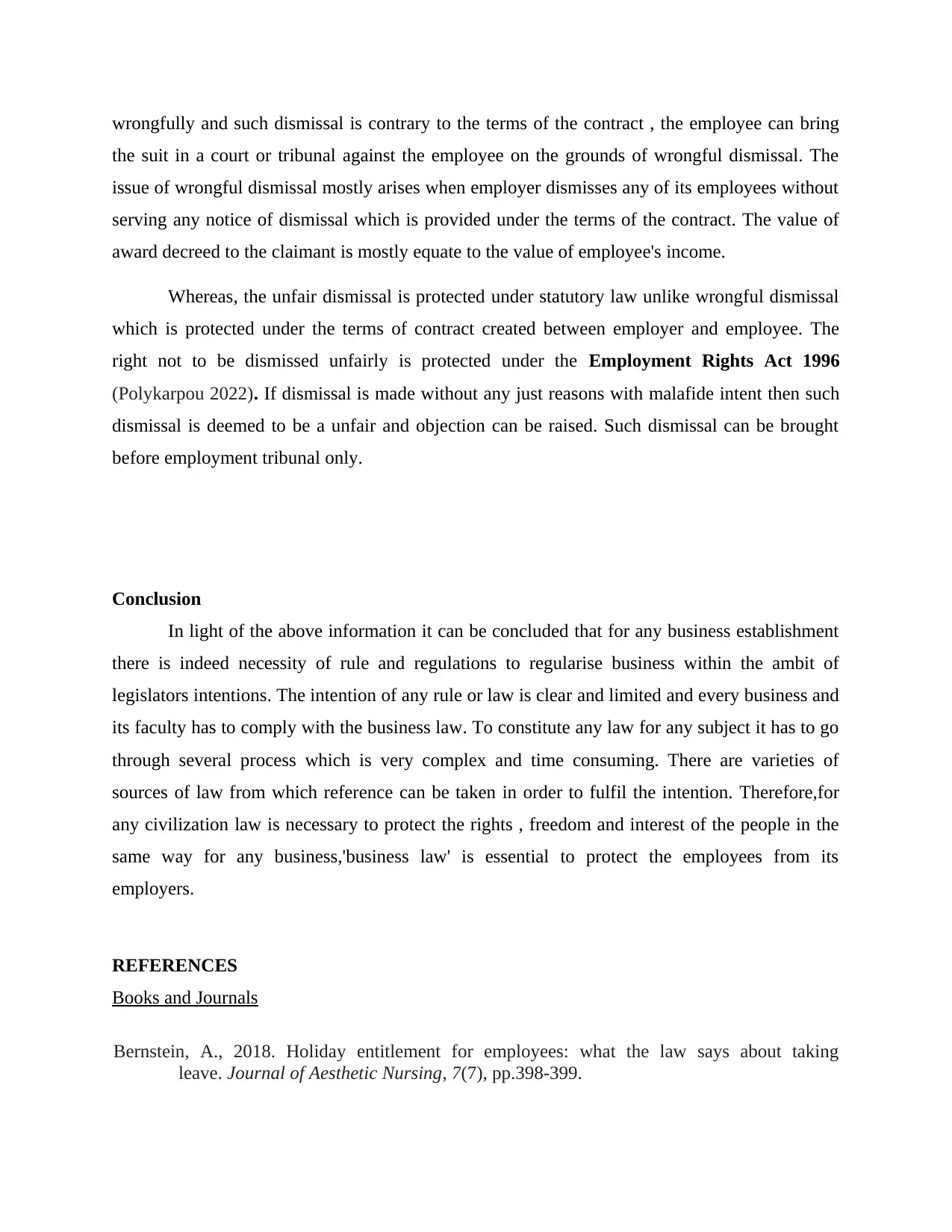
wrongfully and such dismissal is contrary to the terms of the contract , the employee can bring
the suit in a court or tribunal against the employee on the grounds of wrongful dismissal. The
issue of wrongful dismissal mostly arises when employer dismisses any of its employees without
serving any notice of dismissal which is provided under the terms of the contract. The value of
award decreed to the claimant is mostly equate to the value of employee's income.
Whereas, the unfair dismissal is protected under statutory law unlike wrongful dismissal
which is protected under the terms of contract created between employer and employee. The
right not to be dismissed unfairly is protected under the Employment Rights Act 1996
(Polykarpou 2022). If dismissal is made without any just reasons with malafide intent then such
dismissal is deemed to be a unfair and objection can be raised. Such dismissal can be brought
before employment tribunal only.
Conclusion
In light of the above information it can be concluded that for any business establishment
there is indeed necessity of rule and regulations to regularise business within the ambit of
legislators intentions. The intention of any rule or law is clear and limited and every business and
its faculty has to comply with the business law. To constitute any law for any subject it has to go
through several process which is very complex and time consuming. There are varieties of
sources of law from which reference can be taken in order to fulfil the intention. Therefore,for
any civilization law is necessary to protect the rights , freedom and interest of the people in the
same way for any business,'business law' is essential to protect the employees from its
employers.
REFERENCES
Books and Journals
Bernstein, A., 2018. Holiday entitlement for employees: what the law says about taking
leave. Journal of Aesthetic Nursing, 7(7), pp.398-399.
the suit in a court or tribunal against the employee on the grounds of wrongful dismissal. The
issue of wrongful dismissal mostly arises when employer dismisses any of its employees without
serving any notice of dismissal which is provided under the terms of the contract. The value of
award decreed to the claimant is mostly equate to the value of employee's income.
Whereas, the unfair dismissal is protected under statutory law unlike wrongful dismissal
which is protected under the terms of contract created between employer and employee. The
right not to be dismissed unfairly is protected under the Employment Rights Act 1996
(Polykarpou 2022). If dismissal is made without any just reasons with malafide intent then such
dismissal is deemed to be a unfair and objection can be raised. Such dismissal can be brought
before employment tribunal only.
Conclusion
In light of the above information it can be concluded that for any business establishment
there is indeed necessity of rule and regulations to regularise business within the ambit of
legislators intentions. The intention of any rule or law is clear and limited and every business and
its faculty has to comply with the business law. To constitute any law for any subject it has to go
through several process which is very complex and time consuming. There are varieties of
sources of law from which reference can be taken in order to fulfil the intention. Therefore,for
any civilization law is necessary to protect the rights , freedom and interest of the people in the
same way for any business,'business law' is essential to protect the employees from its
employers.
REFERENCES
Books and Journals
Bernstein, A., 2018. Holiday entitlement for employees: what the law says about taking
leave. Journal of Aesthetic Nursing, 7(7), pp.398-399.
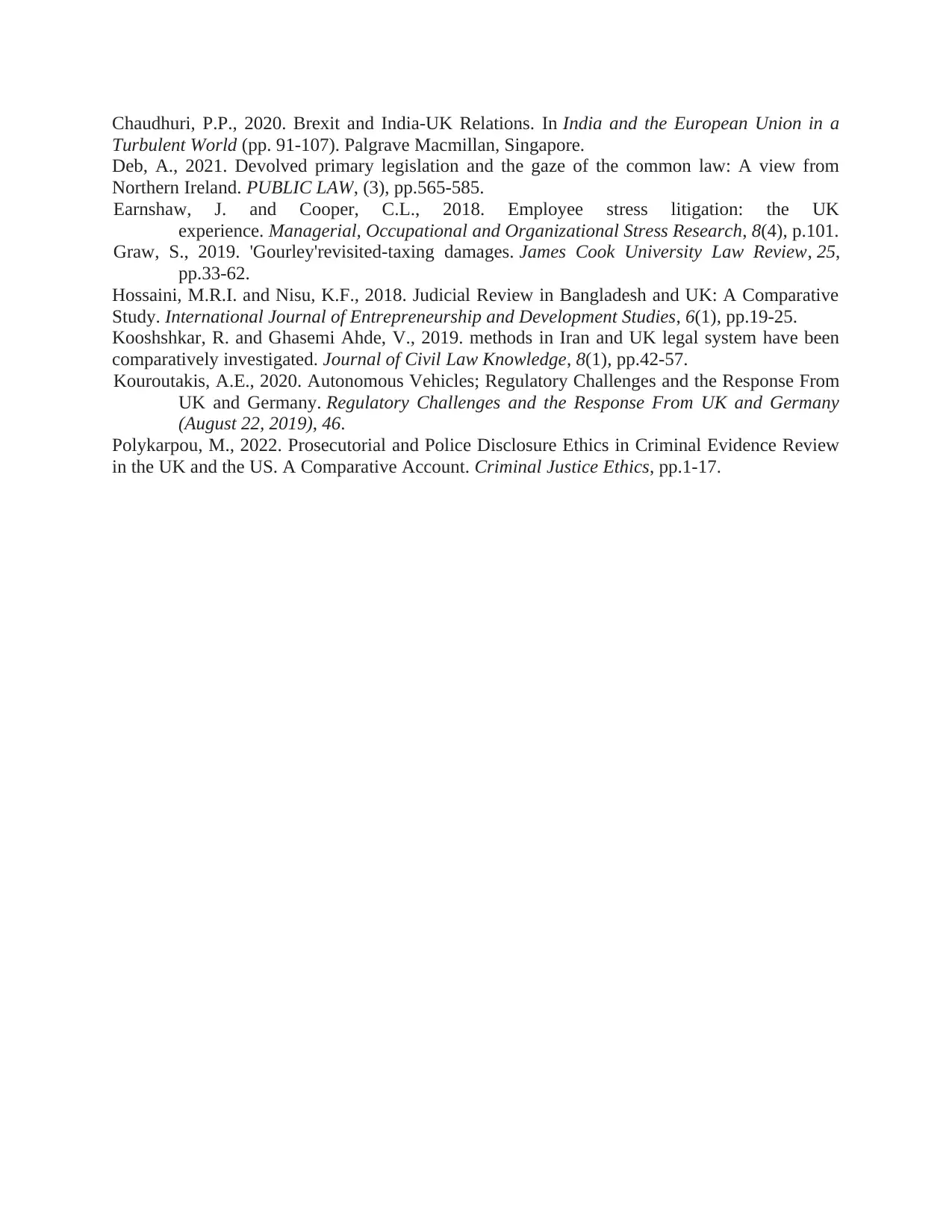
Chaudhuri, P.P., 2020. Brexit and India-UK Relations. In India and the European Union in a
Turbulent World (pp. 91-107). Palgrave Macmillan, Singapore.
Deb, A., 2021. Devolved primary legislation and the gaze of the common law: A view from
Northern Ireland. PUBLIC LAW, (3), pp.565-585.
Earnshaw, J. and Cooper, C.L., 2018. Employee stress litigation: the UK
experience. Managerial, Occupational and Organizational Stress Research, 8(4), p.101.
Graw, S., 2019. 'Gourley'revisited-taxing damages. James Cook University Law Review, 25,
pp.33-62.
Hossaini, M.R.I. and Nisu, K.F., 2018. Judicial Review in Bangladesh and UK: A Comparative
Study. International Journal of Entrepreneurship and Development Studies, 6(1), pp.19-25.
Kooshshkar, R. and Ghasemi Ahde, V., 2019. methods in Iran and UK legal system have been
comparatively investigated. Journal of Civil Law Knowledge, 8(1), pp.42-57.
Kouroutakis, A.E., 2020. Autonomous Vehicles; Regulatory Challenges and the Response From
UK and Germany. Regulatory Challenges and the Response From UK and Germany
(August 22, 2019), 46.
Polykarpou, M., 2022. Prosecutorial and Police Disclosure Ethics in Criminal Evidence Review
in the UK and the US. A Comparative Account. Criminal Justice Ethics, pp.1-17.
Turbulent World (pp. 91-107). Palgrave Macmillan, Singapore.
Deb, A., 2021. Devolved primary legislation and the gaze of the common law: A view from
Northern Ireland. PUBLIC LAW, (3), pp.565-585.
Earnshaw, J. and Cooper, C.L., 2018. Employee stress litigation: the UK
experience. Managerial, Occupational and Organizational Stress Research, 8(4), p.101.
Graw, S., 2019. 'Gourley'revisited-taxing damages. James Cook University Law Review, 25,
pp.33-62.
Hossaini, M.R.I. and Nisu, K.F., 2018. Judicial Review in Bangladesh and UK: A Comparative
Study. International Journal of Entrepreneurship and Development Studies, 6(1), pp.19-25.
Kooshshkar, R. and Ghasemi Ahde, V., 2019. methods in Iran and UK legal system have been
comparatively investigated. Journal of Civil Law Knowledge, 8(1), pp.42-57.
Kouroutakis, A.E., 2020. Autonomous Vehicles; Regulatory Challenges and the Response From
UK and Germany. Regulatory Challenges and the Response From UK and Germany
(August 22, 2019), 46.
Polykarpou, M., 2022. Prosecutorial and Police Disclosure Ethics in Criminal Evidence Review
in the UK and the US. A Comparative Account. Criminal Justice Ethics, pp.1-17.
⊘ This is a preview!⊘
Do you want full access?
Subscribe today to unlock all pages.

Trusted by 1+ million students worldwide
1 out of 9
Related Documents
Your All-in-One AI-Powered Toolkit for Academic Success.
+13062052269
info@desklib.com
Available 24*7 on WhatsApp / Email
![[object Object]](/_next/static/media/star-bottom.7253800d.svg)
Unlock your academic potential
Copyright © 2020–2026 A2Z Services. All Rights Reserved. Developed and managed by ZUCOL.


